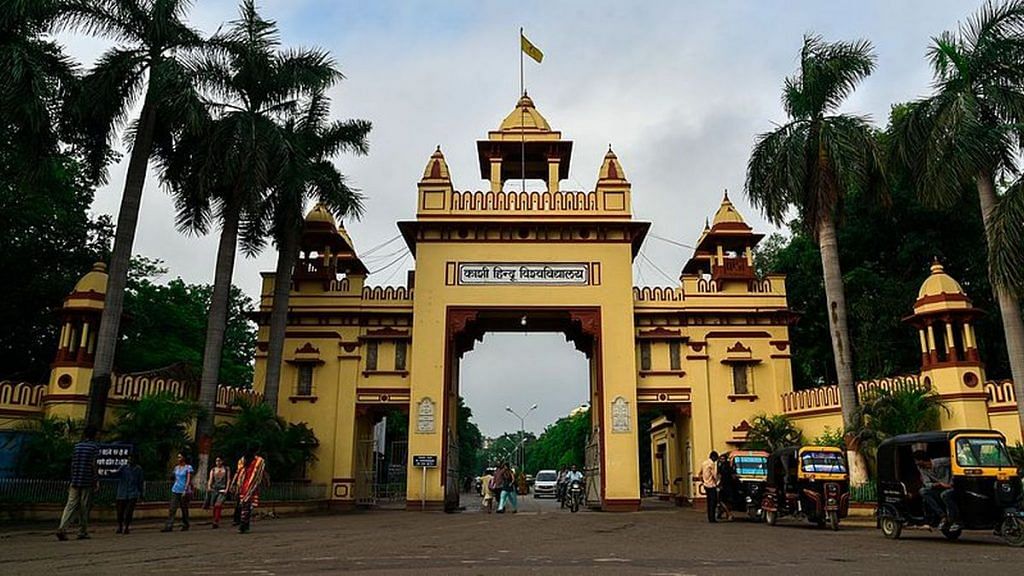New Delhi: Students of Banaras Hindu University (BHU) have been staging sit-in demonstrations for the last week over the appointment of a 29-year-old Muslim professor.
The protest began on 7 November, two days after Feroz Khan was appointed as an assistant professor in the literature department of the faculty of Sanskrit Vidya Dharm Vigyan.
Following the protests, the BHU administration issued a statement, stating the idea behind the establishment of the university was to contribute in nation-building efforts by providing equal opportunity of study and teaching to all deserving people without any discrimination on the basis of caste, religion, gender and sect.
The letter also stated that Khan’s appointment was a unanimous decision made by a selection committee under a transparent process.
When contacted, Khan told ThePrint he felt insulted by the whole incident and that he would have never applied for the job if the university mentioned in the advertisement that they don’t want a Muslim.
‘A Muslim can’t teach us our dharma’
Students claimed that Khan’s appointment is a “conspiracy” and it has hurt the sentiments of Pandit Madan Mohan Malviya, who helped establish the university.
“We have two main allegations. First is that this appointment has been made as part of a conspiracy. The entire process, including the interview, was rigged in favour of Feroz Khan. Secondly, the stone inscription installed in BHU clearly states that no non-Hindu can either study or teach in our department. Then why a Muslim professor was appointed in the faculty,” asked Chakrapani Ojha, a student of the Sanskrit faculty who is leading the sit-in protests, while talking to ThePrint.
Ojha said a Muslim professor’s appointment has hurt the sentiments of Madan Mohan Malviya, “who had clearly said that no non-Hindu can teach or study in the university’s Sanskrit department”.
PhD student Shubham Tiwari, who is also taking part in the protests, told ThePrint: “In this department, there are no teachers, all are our gurus. Everyone keeps a choti (tuft of hair on the head), we touch their feet and participate in havan (a ritual). If a Muslim professor is accorded a place in the department, then it will be open discrimination against the students. A Muslim can’t teach us our dharma.”
The university says there is no stone inscription on the premises that says non-Hindus can’t study or teach in BHU.
Also read: BHU chief proctor named in student’s murder says not involved, I’m being dragged in
Can’t reject an application based on religion, says V-C
BHU Vice-Chancellor Rakesh Bhatnagar told ThePrint the university cannot reject someone’s application based on his caste or religion.
“The country follows a specific set of laws and as per that law, all are equal. The (Sanskrit) department had issued an advertisement seeking the appointment of a professor. In that advertisement, it wasn’t mentioned that a person from any specific religion will not be acceptable. One candidate among the final shortlisted applicants was finally appointed with a unanimous decision,” he said.
On the students’ protest, the V-C said, “They met me and submitted a memorandum. After that, I asked the registrar to cross-check all the rules and documents. No rules were found to be violated during the appointment process.”
Asked to comment on the “inscription”, Bhatnagar categorically said there is no such stone installed in the university.
‘Khan was the most eligible candidate’
Head of Sanskrit department professor Umakant Chaturvedi told ThePrint Khan was the most eligible candidate among all the applicants.
“Twenty-nine persons had applied for the post and 10 were shortlisted for interview. Nine candidates appeared for the interview and the selected candidate was the most eligible among all. While other applicants had scored between 0-2 out of 10, the selected candidate had scored 10 out of 10,” he said.
Chaturvedi said if the students are saying Pandit Malviya’s sentiments have been hurt by the appointment of a Muslim professor, he has no objection to amending the university rules. But he also said he still believed Khan was the best among all candidates.
‘Felt insulted that I can’t teach Sanskrit because I’m Muslim’
In a telephonic conversation with ThePrint, Khan said his parents cried the whole night when they heard about the controversy on television.
“When I took admission in Jaipur, I was the only Muslim student in my batch. I never felt ‘Muslim’, but I am feeling insulted that I cannot teach a certain subject just because I am a Muslim,” he said.
Khan is a native of Bagru village, nearly 32 kilometres from Jaipur. He has been teaching Sanskrit as a guest faculty in Janipur’s Rashtriya Sanskrit Sansthan. He completed his PhD from there last year.
His father and younger brother have also studied Sanskrit. Khan said his father sings bhajans to raise fund for maintaining cowsheds.
“I have never felt discriminated before. If they didn’t want a Muslim in the Sanskrit department, they should have clearly mentioned it in the advertisement. I wouldn’t have applied then,” he asserted.
Speaking to ThePrint, Khan recited a Sanskrit shloka (verse) that he had studied in school to explain “what Sanatan Dharam stands for”. Translated, the shloka means malice never leads to peace, the only way to get rid of hatred is to leave hatred.
Also read: BHU students protest against alleged reinstatement of professor accused of molesting student
